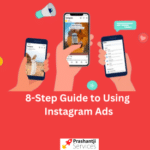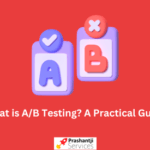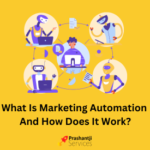Introduction to Marketing Automation
Are you tired of manually managing your digital marketing campaigns? Do you want to streamline your efforts and increase efficiency? Look no further than marketing automation! In this blog post, we’ll introduce you to the world of marketing automation and show you how it can simplify your digital marketing efforts. From lead generation to email campaigns, social media management to analytics, we’ll cover it all. Get ready to say goodbye to tedious manual tasks and say hello to a more efficient and effective approach with marketing automation.
What is Marketing Automation?
Marketing automation is a software solution that helps marketing teams automate repetitive tasks and workflows. By automating these tasks, marketing teams can focus on more strategic initiatives that will help them reach their goals. Marketing automation software often includes features such as email marketing, lead management, and campaign tracking.
Email marketing is one of the most common use cases for marketing automation. With email marketing, businesses can send automated emails to their customers or prospects based on certain trigger events. For example, a business could set up an automated email campaign that sends a welcome email to new subscribers. Or, a business could set up an automated email campaign that sends discount codes to customers who haven’t made a purchase in a while. Email marketing campaigns like these can help businesses boost their sales and improve their customer retention rates.
Lead management is another common use case for marketing automation. With lead management features, businesses can automatically capture leads from online forms and track their progress through the sales funnel. Additionally, businesses can set up automatic lead nurturing campaigns that send targeted emails or other communications to leads who are inactive or showing signs of disengagement. Lead management features can help businesses close more deals and increase their ROI from their marketing efforts.
Campaign tracking is another key feature of many marketing automation platforms. With campaign tracking, businesses can see how many people are opening and clicking through their emails or other communications. Additionally, campaign tracking often includes detailed reporting on which channels are performing best and how different segments of

Benefits of Using Marketing Automation
Marketing automation can be a game-changer for small businesses. It can help you nurture leads, close more deals, and free up your time so you can focus on other aspects of running your business.
Here are some of the benefits of using marketing automation:
- Generate More Leads: Marketing automation can help you generate more leads by automatically nurturing prospects with targeted content.
- Close More Deals: Automated lead scoring and nurturing can help you close more deals by ensuring that your sales team is only focusing on the hottest leads.
- Free Up Your Time: By automating repetitive tasks, marketing automation frees up your time so you can focus on strategy and other important tasks.
- Improve Customer Retention: Marketing automation can help improve customer retention by sending automated follow-up emails after purchase.
- Gain Insights: Automated data collection and reporting can help you gain insights into customer behavior, so you can make better decisions in the future.
- Optimize Your Processes: Automation can help you optimize your processes to ensure that all leads are being handled efficiently.
Types of Tools Used in Marketing Automation
When it comes to marketing automation, there are a variety of tools that can be used in order to streamline your digital marketing efforts. Here are some of the most popular types of tools that are used in marketing automation:
1. Email Marketing Software: Email marketing software is one of the most commonly used types of tools in marketing automation. This type of software allows you to automate your email marketing campaigns, making it easier to stay in touch with your customers and prospects.
2. Lead Management Software: Lead management software is another popular type of tool that is used in marketing automation. This type of software helps you capture and manage leads, making it easier to follow up with potential customers.
3. Customer Relationship Management (CRM) Software: CRM software is another essential tool for marketing automation. This type of software helps you track and manage your customer relationships, making it easier to provide them with the best possible experience.
4. Social Media Management (SMM) Software: SMM software is also a popular type of tool that is used in marketing automation. This type of software helps you automate your social media campaigns, making it easier to connect with your audience on various platforms.
5. Analytics Software: Analytics software is another important tool for marketing automation. This type of software helps you track your campaign performance, so you can see what’s working and what isn’t. Additionally, analytics software can help you segment your audiences and target them more effectively.
6. Content Management System (CMS) Software: CMS software is another type of tool that is used in marketing automation. This type of software helps you create, manage, and optimize your digital content, making it easier to keep your campaigns up-to-date.
Best Practices for Setting Up a Marketing Automation System
When it comes to marketing automation, there are a few best practices to keep in mind when setting up your system. First, you’ll want to make sure you have a clear goal in mind for what you want to achieve with your marketing automation. This could be anything from increasing leads to improving customer retention. Once you know your goal, you can start to put together the pieces of your marketing automation system.
Next, you’ll need to choose the right platform for your needs. There are a number of different marketing automation platforms on the market, so it’s important to do some research and find one that will fit well with your business. Once you’ve found a good platform, take the time to set it up properly. This includes integrating it with your other marketing tools and making sure all of your staff know how to use it.
Don’t forget to test and measure your results. Marketing automation is a powerful tool, but it’s only as good as the data you put into it. Make sure you’re tracking your progress and tweaking your system as needed to get the most out of it. With these best practices in mind, you’ll be well on your way to successful marketing automation.

Tips For Getting Started With Digital Marketing Automation Strategies
When it comes to getting started with digital marketing automation strategies, there are a few key tips to keep in mind. First, it’s important to understand the basics of marketing automation and how it can help your business. Next, you need to identify your goals and objectives for using marketing automation. Once you have a clear understanding of these two things, you can start to develop a plan for implementing marketing automation into your business.
One of the most important things to keep in mind when getting started with digital marketing automation is to make sure that your website is optimised for search engines. This means ensuring that your site is properly keyword researched and that all of your content is high quality and relevant to your target audience. Without SEO, your chances of success with marketing automation will be significantly reduced.
Another crucial tip for getting started with digital marketing automation is to create a process for tracking and measuring your results. This will help you to determine whether or not your strategies are working and what changes need to be made in order to improve your results. Without tracking and measuring, it will be difficult to tell if your efforts are paying off or not.
It’s also important to keep in mind that digital marketing automation takes time to implement and see results from. Rome wasn’t built in a day and neither will your successful digital marketing campaign. Be patient, consistent, and always be learning and testing new things in order to see the long-term success that
How to Integrate Other Digital Channels Into Your Automation Process
Digital marketing automation can help simplify your digital marketing efforts by incorporating other digital channels into your process. Here are some tips on how to do this:
1. Define your goals and objectives. What do you want to achieve with your digital marketing automation? Once you know this, you can start to integrate other channels that will help you reach your goals.
2. Identify which channels will best help you reach your target audience. This may include social media, email, paid advertising, or even traditional marketing channels like print or TV.
3. Create a plan for how you will integrate these channels into your overall process. What content will you share? How often? Who will be responsible for creating and sharing this content?
4. Execute your plan and track your results. Make sure to measure the success of your efforts so that you can adjust your strategy as needed.
By following these tips, you can start to integrate other digital channels into your automation process and make your digital marketing more effective and efficient. Digital marketing is no longer about isolated channels or campaigns. It’s an integrated process that should include all of your online and offline marketing efforts. Your website, social media, email, and even your brick-and-mortar store are all connected.
You can’t just automate one part of your digital marketing and expect the rest to fall into place. All of your digital channels need to work together in harmony to create a seamless customer experience.
Here are a few tips on how to integrate other digital channels into your automation process:
1. Keep Your Branding Consistent Across All Channels
Your customers should be able to recognize your brand no matter where they encounter it. That means using the same colors, fonts, logos, and overall aesthetic across all of your channels.
2. Make Sure Your Website Is the Hub of Your Digital Marketing Ecosystem
Your website should be the center of your digital marketing efforts. Everything else should lead back to your website. That includes social media posts, email campaigns, and even ads.
3. Use Email to Drive Traffic to Your Other Channels
Email is still one of the most powerful digital marketing tools at your disposal. Use it to drive traffic to your other channels, such as your website or social media profiles. Include links in your emails that lead recipients back to your other content.
4. Automate Social Media Posts That Promote Other Content
Social media is a great way to get your content out to the world. Automate posts that link back to other content, such as blog posts or videos. This will help drive traffic back to your website and other channels.
5. Track the Performance of All Your Channels
Make sure you are tracking the performance of each channel so you can adjust your strategy as needed. Use analytics tools like Google Analytics or Facebook Insights to track metrics like pageviews, likes, and shares.
By integrating other digital channels into your automation process, you can create a seamless customer experience and maximize the impact of your digital marketing efforts.

Conclusion
In conclusion, marketing automation is a powerful tool for marketers looking to streamline their digital marketing efforts. With the right technology and strategy in place, you can automate your campaigns and tasks effectively while saving time and money. It’s important to remember that automating your campaigns shouldn’t replace human interaction – it should enhance it. By leveraging the power of automation, you will be able to reach more customers with less effort, allowing you to make better use of your resources.
In addition, marketing automation can help you deliver more personalized experiences for your customers, which is essential in today’s digital age. By creating automated campaigns that are tailored to individual needs, you can build trust and loyalty with your customers, which will in turn lead to increased engagement and sales. With the right marketing automation software in place, you can ensure that all of your digital marketing efforts are running optimally and efficiently.








